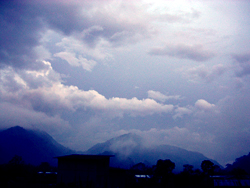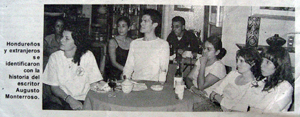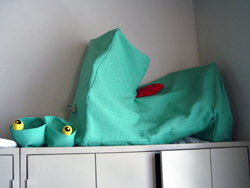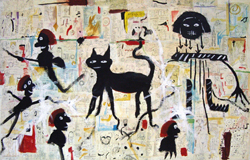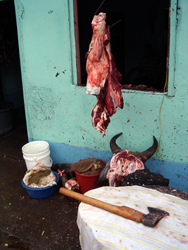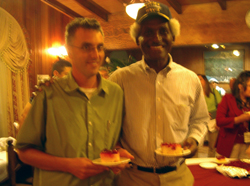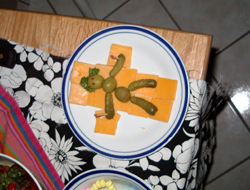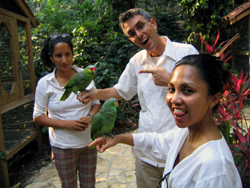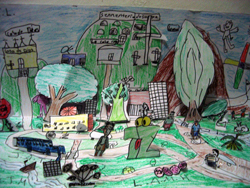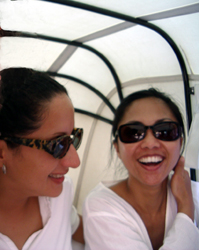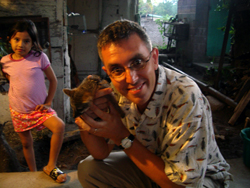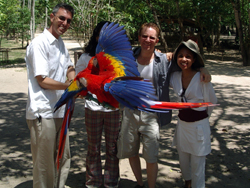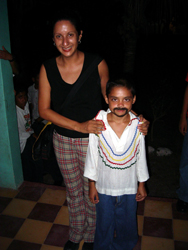More Tales From Bananaland
Dispatch from Zacapa - Honduras May 2004

|
|
On Cloud Nine As is prone in sub-tropical jungle during mid summer it’s hot here. With the heat comes compensation in the form of thunderstorms and extreme weather. If you thought the clouds at the beginning of The Simpson’s were impressive then you should come to Honduras. I have become particularly interested in clouds. Right now, clouds are where it’s at, especially during twilight as the thunderstorms approach and the sharp blue sky gives way to puffs of white which in turn mix with gray as lightning and sunsets pepper the scene with reds and oranges. It’s all very poetic as well as clammy and drippy. |
| Acts of God It’s a funny thing thunderstorms. The Catholic priest’s computer was stuck by lightning which is funny on so many levels and has spurned many act-of-god jokes. Yesterday we had another summer storm in which the roof of the library admitted vast quantities of water but only next to the section of religious books. What’s going on? Our balcony flooded as well complete with frogs. The first time we ever entered Zacapa, we were almost struck by lightning and were (literally) soaked to the skin. Some might call that a baptism but at least that bolt missed us and thus served only as a warning. |
One
toad, two toes and three inches of water. |
|
Fame! Fame! What's Your name? I set digit to digital document with enthusiastic jubilation having just received the latest issue of the Guardian Weekly with an article by me (it’s also on the web here) for which I had to refuse the humble sum I was offered which is consistent with [Name of International Development Agency Removed by request] policy regarding publications as volunteers may not accept payment for anything they write or photograph that appears on the Web. Coincidentally I discovered my image---mouth stuffed full of bread---splashed across the page of the local Honduran newspaper as well after we attended a (most likely the only) weekly “foreign film” night in Tegucigalpa. |
| Mangomania Anyway, enough said because it’s mango season! And what could be more fun than to make your own seasonal chutney. Branston Pickle is actually one of the items that would make the top five of items most missed from the so-called civilized world and thus with our free abundance of fruit we produced our own special brand of cheese topping Honduran style (tamarinds, prunes and habañero sauce included) and amazingly it came out pretty well. It makes us feel old, bottling our own preserves, but living under these conditions calls for extreme action. Mango
makes a mean jam as well. Stay tuned for mango bread and mango beer. |
|
|
|
Good things come in strange packets Honduras is a perplexing country. The Mayans never really bothered to spread any further than the far west of the country preferring Guatemala and Southern Mexico. Columbus couldn’t find a place to land. The Spanish never really got a foothold because of internal disputes between the "Creoles" and the “Peninsulares” who couldn’t even decide on a capital (for a while there was two) and provided very little infrastructure. On top of that, the pesky British pirates made the coastline bad for “business” and the descendants of a shipwrecked slave ship formed the large Garífuna community along the north coast creating a kind of Honduran Haiti. The Mosquito Coast to the East remains today as impenetrable as ever although the Miskito have been there longer than anyone. |
While all the other Latin American countries were fighting for independence, Honduras was still fighting itself. Honduras started borrowing money in 1824 and hasn't stopped borrowing since. Decades of economic exploitation by the US, military rule, corruption, a huge wealth gap, crime and natural disasters have rendered Honduras one of the least developed and least secure countries in Central America. Honduran society is rife with economic inequality. Malnutrition, poor housing and infant diseases are widespread. Poverty, and the prospects offered by drug trafficking, have contributed to a virulent crime wave, conducted mainly by scores of disenfranchised youth influenced by deported gang members from the US. |
|
|
|
Meanwhile, public officials have been implicated in high-profile crimes, and the police are thought to have been involved in the murders by death squads of countless “street” children and political opponents. In addition, former military and security personnel, along with right-wing paramilitary groups, are said to have been behind the murder of members of indigenous minority rights groups. On top of all this Honduras was devastated by Hurricane Mitch in 1998. At least 5,000 people were killed and 70% of the country's crops were destroyed. So for every four bananas, nearly three were mashed, crushed and generally destroyed. The damage was estimated at three billion dollars, setting development back by decades. |
But Honduras amazingly retains its dignity and appears to be moving forward. It is now only the third poorest country in the Western hemisphere after Haiti and Nicaragua. Its people are polite and friendly. There is a strong sense of community and an acknowledged common struggle against social problems. It boasts some of the best beaches in Central America, it’s own Caribbean Islands and reefs, some of the best Mayan ruins, unspoiled natural beauty in pristine rain and cloud forests, stunning flora & fauna, an anthropologists dream mix of indigenous cultures and no history of violent civil unrest. Despite the corruption and dependency, Honduras also has the longest functioning political democracy in Latin America. |
|
|
|
It’s good to know the history of Honduras because it’s easy to blame the problems of Hondurans on their own failings. Along with so much external pressure, foreign ownership of resources and the “effects of globalization” is it any wonder than any country, never mind Honduras, under the regressive control of the IMF and World Bank can make any progress? But then perhaps that’s the idea. I find it important
to remind myself of the larger sphere in which we operate as in the
words of Rick Blaine "it doesn't take much to see that the problems
of three little people don't amount to a hill of beans in this crazy
world". |
| Plead the First At this point it might be interesting for me to espouse my views on the organization I’m volunteering for. Firstly, it has to be said that [name of international volunteer organization removed by request] is second to none in giving the absolutely best support, resources and benefits that you could hope for including emergency and safety procedures and medical care that are extremely thorough. This means that we all have the opportunity to do really good work on valuable projects in accordance with the goals of the organization. The volunteers in Honduras—for the most part—do excellent work and have a positive impact on the communities where they live, and the reputation of the organization in Honduras is exemplary. |
|
|
|
However
like any large government bureaucracy it is bogged down with long drawn
out processes that bog down anything you want to do and there are some
strange rules. For example everything I write, draw or create at any
time during the two years of service becomes the immediate property
of the organization and is subject to censure (and myself to “administrative
separation”) if it is assessed to “embarrass or reflect
poorly on the organization or the countries where volunteers serve”.
Of course I don't feel I have a "bad" word to say against
either the organization nor Honduras and there has to be one rule for
all. I can say quite categorically that my fellow volunteers do quite
literally encompass all walks of American stereotype good and bad (albeit
tilted generously towards white college graduates from North Carolina)
so the chances are they'll be one bad banana sooner or later. |
| I am not used to being told what to think. It seems strange and oddly (dare I say it) un-American. Writing this now I feel that I am self-censoring myself. You may notice I am not mentioning the name of the organization although bizarrely they have asked me to put disclaimers at the bottom of all pages which defeats the object of anonymity. We were not asked to sign a form waiving our rights to freedom of expression. However, it seems that there have been recent instances of subversive activities on volunteers web sites which have been monitored, and all volunteers have now been subjected to strict "guidelines" for their personal web sites which now have to be approved by a government office "task force" in Washington DC for "security" reasons. |
|
|
|
Mayans, Minimos and Mother's Day We had our first visitors from the US who dropped in on their way back from Costa Rica. We spent a great deal of time comparing our lives before and after, etc. and mellowed out among the splendid Mayan ruins of Copán where monkeys and macaws can be espied. Unsurprisingly, Copán boasts the best eating, drinking and entertainment options in all of Honduras as well as the most tourists some of whom will happily let you complete their New York Times crosswords. In fact it's not like being in Honduras at all. |
| Mother's Day is a much celebrated event here. Every school, college and kindergarten host events for mother's only in which the kids will dress up and strut their traditionally Honduran stuff. Oddly enough there is no Father's Day. The official symbol of Honduras is a chicken but more appropriate in my opinion would be the "minimo". These are essentially miniature bananas, too small for export so that's what the poor Hondurans end up eating. It's a kind of cruel joke but they sure look cute. We continue to volunteer away. One day soon the first edition of our Zacapa newspaper will roll from the presses. We have our own TV show and we are both teaching art (Lemon) and health & self-esteem (Julia). We have formed a theater group, a cultural magazine, started several web sites and educated entire communities on the dangers of poo-borne diseases. Not bad for the first nine months. |
|
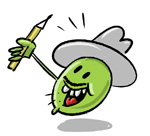
Previous dispatch | Next dispatch
©
J. Lemon / Lemonworld 2005. All rights reserved. This
web site is not an official publication of the Peace Corps or the U.S.
Government. The contents of this Web site reflect the personal opinions
and observations of the individual(s) contributor(s) and do not reflect
any position of the U.S. Government or the Peace Corps. |
